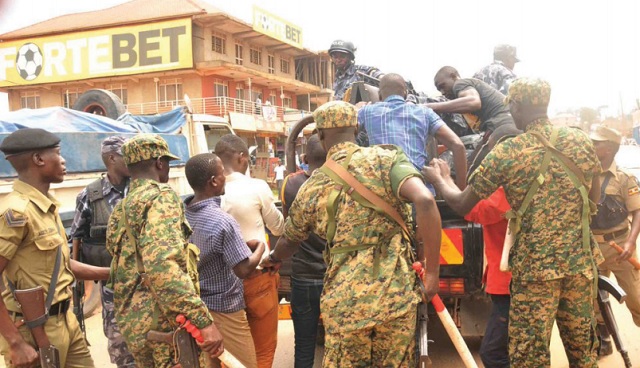
How `people power’ hit national stage with protests
Kampala, Uganda | FLAVIA NASSAKA | As he left the Chief Magistrate’s court in Gulu on Aug.16, Arua Municipality MP-elect Kassiano Ezati Wadri , chanted, “We shall overcome, We shall overcome” as a group of people peeping through the court’s wire mesh fence waved back; flashing the V-sign of the opposition Forum for Democratic Change (FDC) party. Then he staggered onto a waiting pickup truck with his right hand clamped by a pair of handcuffs he shared with a co-detainee.
The Arua Municipality election was quickly becoming a public relations disaster for the government and President Yoweri Museveni personally since it emerged that the elite troops that guard him had acted outside the law, shot, injured, and killed civilians, tortured MPs and other civilians, and vandalised property . The torture and detention of MPs was headline news on BBC.
It is the latest sign of the increasing militarisation of political contests in Uganda under Museveni and follows the September 2017 incidents when security forces entered parliament and beat up and detained several MPs. Now, it appears, the brutality of the security forces is being matched by rising civilian defiance with no clear end in sight.
Following the actions of the Special Forces Command (SFC) that guards Museveni in Arua, riots have rocked parts of the country. On Aug. 20, riots broke out and teargas and bullets rung out in downtown Kiseka area where police arrested over 100 protesters. Protests alsospread to city suburbs of Katwe where police shot one dead, Kibuye, Ndeebe, and Nateete, the nearby towns of Mukono and even farther in Jinja and Busia in eastern Uganda. On Aug.19, one person was shot dead in Mityana and several injured, including police officers. Earlier, on Aug.18 the police had running battles with youth burning tyres and barricading roads in the Kamwokya suburb of Kampala city. Teargas was fired and several were injured and arrested.
In an escalating wave, the SFC has been condemned by foreign embassies, civil society organisations, religious leaders, and human rights activists.
The Independent has learnt that Museveni is anxious that reporting of the incident and its aftermath is controlled if not stopped, especially on TV. Insiders told The Independent that Museveni instructed the Minister of information, Frank Tumwebaze, to caution media houses that they would be shut down if they persist on such reports. And Tumwebaze has, in turn, instructed the Uganda Communications Commission (UCC) which regulates the broadcast sector to cascade the president’s warning and clampdown on breaches.
Museveni has also launched a one-man PR campaign involving threats and sweeteners. He has called the media purveyors of fake news for reporting the torture, dubbed civil society agents of foreign governments, and labeled election officials corrupt.
“Pseudo-democrats, be informed that the game of trying to hijack our democracy by fascists and foreign agents is over. We shall not tolerate any threats by words or by actions. Enough is enough. Media houses should also stand warned. Do your mandate: balanced reporting,” he said in a statement on Aug.20.
But Museveni has also pledged a clean-up within his ranks.
“I will uproot those evils,” he said, “A revolutionary politician is like a mulokole- no cheating, no lying. No killing prisoners. No mistreatment of prisoners.”
The fire Museveni is attempting to put out is the most unexpected outcome of a byelection to replace slain NRM legislator Ibrahim Abiriga which should have been an open and seal case for the NRM; after all the ruling party won seven of the eight parliamentary seats in the district. But with Abiriga, a veteran of the post-1986 wars political negotiations and reconfigurations, out of the picture, the area dramatically offered an opportunity for all.
Up to 12 candidates offered themselves and by the time election results were declared a little before 10pm on Aug.15, Wadri had won. But attention had shifted to his whereabouts – which were still unclear.
All that was known is that he had been picked up by the rampaging SFC who also raided Hotel Pacific in Arua, ransacked it, arrested over 30 people including five opposition MPs and battered them thoroughly. The SFC was apparently angry that someone had allegedly thrown stones at the presidential motorcade, shattering the rear glass of Museveni’s official car.
Wadri was to reappear on Aug.16 at the Gulu Magistrates court about 250kms away from his constituency. Together with three other MPs and a motley collection of their supporters, Wadri was charged with treason and remanded to Gulu Prison until Aug.30. The basis is the alleged stoning of the Presidential motorcade which is possibly a frivolous charge of limited legal consequence.
Instead it is the charges against Kyadondo East MP Robert Kyagulanyi aka BobiWine; the poster child of the so-called People Power Movement that aided Wadri’s election that are significant. Bobi Wine now faces a battery of charges including treason and unlawful possession of guns and ammunition. According to most pundits, the charges are likely to be trumped up. Also, although his co-accused are being charged in civilian courts, Bobi Wine is being charged in the army court martial. That automatically means a long incarceration, being deprived of basic due process and rights of a prisoner, and an uncertain resolution.
 The Independent Uganda: You get the Truth we Pay the Price
The Independent Uganda: You get the Truth we Pay the Price



